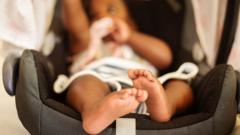How Did a Woman Smuggle a Baby into the UK with a Fake Birth Story?

## The Disturbing Reality of Baby Trafficking: A Case Study from Nigeria to the UK
The harrowing story of a woman arrested at Gatwick Airport after arriving from Nigeria with a young baby girl has unveiled a chilling reality: the trafficking of babies across borders for illegal adoption or other nefarious purposes. This incident sheds light on a troubling trend that has caught the attention of authorities, social workers, and the media alike. It is a tale of deception, desperation, and the exploitation of vulnerable individuals.
In this article, we will delve deeper into the case of the woman, referred to as Susan, and her baby, Eleanor. We will explore the broader implications of baby trafficking, the role of "baby factories" in Nigeria, and the measures being taken to combat this heartbreaking issue.
### The Case of Susan and Eleanor
In June 2024, Susan, a Nigerian woman residing in West Yorkshire, UK, traveled back to Nigeria with a purported pregnancy. Upon her return to the UK with a baby girl, she was arrested on suspicion of trafficking. Initially, Susan claimed that she had been pregnant, but medical examinations revealed that she had a tumor instead. The situation escalated when DNA tests indicated no biological link between Susan and the baby.
#### The Investigation
Following her arrest, an investigation led by Henrietta Coker, an experienced social worker, ensued. Coker visited the medical centers Susan claimed to have used for IVF and childbirth, only to discover that the documents she provided were likely forged. The tale took a darker turn as Coker uncovered the existence of illegal "baby factories" in Nigeria, places where vulnerable women are exploited, and babies are commodified.
### Understanding Baby Factories
Baby factories have become infamous in Nigeria and other parts of West Africa. These establishments often operate under the guise of legitimate medical facilities but are, in reality, involved in the illicit trade of infants. Some key aspects of this disturbing phenomenon include:
- **Kidnapping and Exploitation**: Many of the women involved are victims themselves, often kidnapped, raped, and forced to bear children. These tragic circumstances highlight the systemic issues of poverty and lack of education that plague these areas.
- **Illegal Adoption**: The babies produced in these factories are frequently sold to individuals or couples willing to pay large sums of money for a child. The prices can range from £2,000 to £8,000, excluding travel costs.
- **Lack of Regulation**: The Nigerian government has shut down numerous baby factories, yet the practice persists, partly due to inadequate legal frameworks and enforcement.
### The Legal and Social Implications
The case of Susan and Eleanor is not an isolated incident. Experts believe that more children have been unlawfully brought to the UK from West Africa. This raises several critical questions regarding the legal framework surrounding adoption and child welfare.
#### Changes in Adoption Policies
In response to rising concerns about child trafficking, the UK government has tightened restrictions on adoptions from Nigeria. Some notable changes include:
- **DNA Testing**: In the past, DNA tests were required before newborns could be brought to the UK. However, this practice was halted in 2018 due to legal concerns. Without such measures, the potential for illegal adoptions remains high.
- **Increased Scrutiny**: Authorities are now more vigilant in monitoring cases that involve international adoptions, particularly from regions known for trafficking.
#### The Role of Social Workers and NGOs
Social workers like Henrietta Coker play a crucial role in investigating these cases. They provide essential insights into the backgrounds of children and families involved, helping to safeguard the welfare of vulnerable individuals. Non-governmental organizations (NGOs) such as ECPAT are also crucial in raising awareness and advocating for policy changes to combat child trafficking.
### The Psychological Impact on Children
The psychological effects of trafficking on children like Eleanor can be profound and long-lasting. The trauma of separation from their biological parents, compounded by the uncertainty of their identities, can lead to:
- **Attachment Issues**: Children may struggle to form healthy attachments, having been uprooted from their familial bonds.
- **Identity Crisis**: Growing up without knowledge of their biological origins can lead to confusion and distress as they seek to understand their place in the world.
- **Emotional Distress**: The lack of stability and the experience of being part of a trafficking scheme can result in anxiety, depression, and other mental health challenges.
### Combating Baby Trafficking: What Needs to Be Done?
Addressing the issue of baby trafficking requires a multi-faceted approach that involves government action, community engagement, and international cooperation. Here are some strategies that could be implemented:
#### Strengthening Legal Frameworks
- **Implementing Comprehensive Legislation**: Governments need to enact robust laws that not only penalize trafficking but also provide support for victims and survivors.
- **International Cooperation**: Countries must work together to address the root causes of trafficking, sharing intelligence and resources to combat illegal adoption practices.
#### Raising Awareness and Education
- **Community Outreach**: Educating communities about the dangers of trafficking and the legal avenues for adoption can empower individuals to make informed decisions.
- **Engaging with Vulnerable Populations**: Targeting at-risk groups with support services can help prevent them from falling victim to trafficking schemes.
### Conclusion
The case of Susan and Eleanor serves as a poignant reminder of the dark realities associated with baby trafficking. It underscores the need for continued vigilance, education, and reform to protect vulnerable children and families. The exploitation of individuals for profit is a heinous crime that demands urgent action from all sectors of society.
As we reflect on these issues, we must ask ourselves: What can we do to raise awareness and combat the trafficking of children on a global scale?
### Frequently Asked Questions (FAQs)
#### What are the signs of baby trafficking?
Signs of baby trafficking can include:
- Unusual birth stories or discrepancies in parental claims.
- Lack of documentation regarding a child's birth.
- Suspicious behavior from supposed guardians.
#### How can I report suspected baby trafficking?
If you suspect baby trafficking, you can report your concerns to local authorities, child protective services, or specialized NGOs that deal with trafficking situations.
#### What should I do if I suspect a baby is in danger?
If you believe a child is in immediate danger, contact emergency services or local law enforcement. Your report can be vital in protecting vulnerable children.
#### Are there legal avenues for adoption in the UK?
Yes, there are legal pathways for adoption in the UK, including domestic and international adoptions. It's essential to go through recognized agencies and adhere to legal requirements.
### Call to Action
As we continue to uncover the harsh realities of baby trafficking, let us strive to create a world where every child has the right to know their identity and live free from exploitation. Together, we can make a difference.
#BabyTrafficking #ChildWelfare #EndChildExploitation
Published: 2025-07-14 05:04:08 | Category: technology



